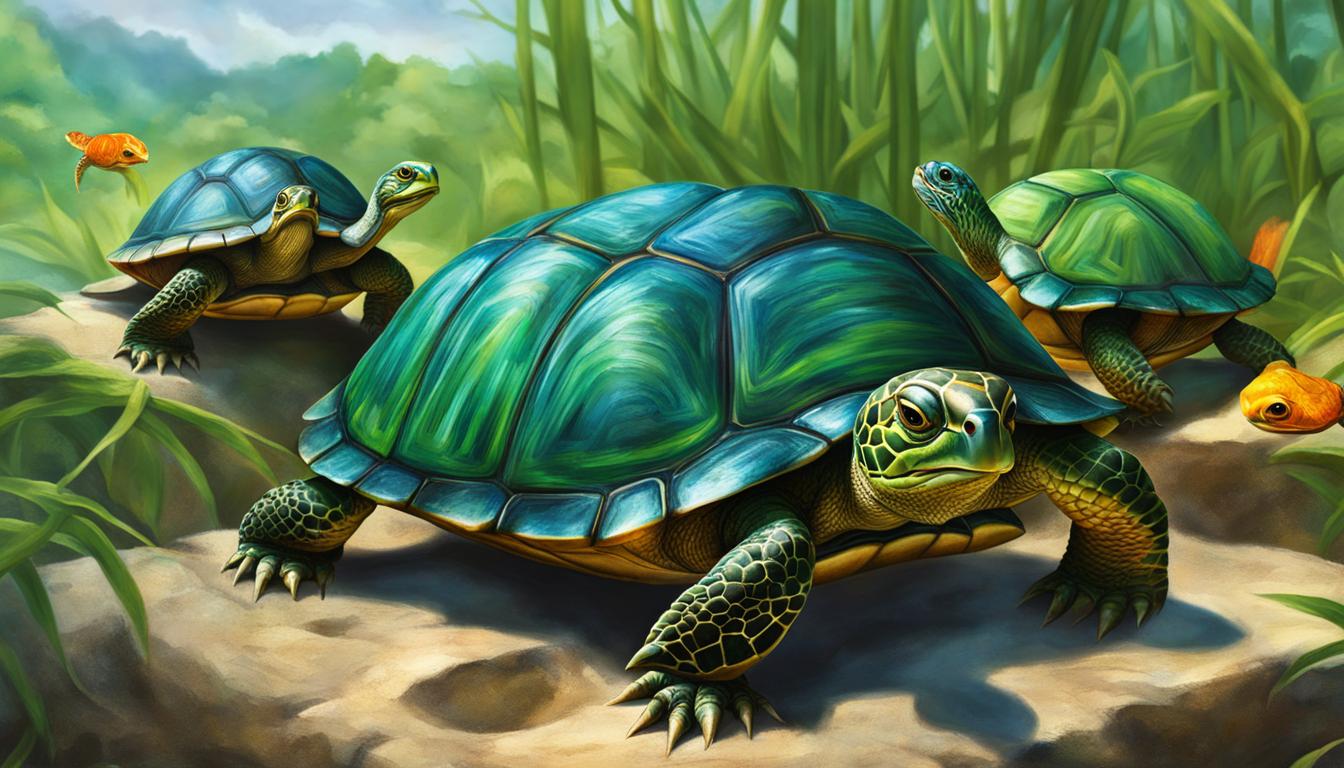Unveiling the Truth: Are Turtles Dumb?
The concept of turtles being dumb is often brought up in popular culture, but is there any truth to it? Let’s delve into the facts and explore the intelligence of turtles.
Table of Contents
Key Takeaways:
- Turtles are not dumb creatures, contrary to popular belief.
- They possess certain levels of intelligence and exhibit problem-solving skills.
- Turtles have the ability to learn from experience and remember things.
- Their brain structure enables them to navigate their environment and recognize their surroundings.
- Turtles have adapted to various habitats and have unique characteristics that allow them to thrive.
The Intelligence of Turtles

Contrary to the common misconception, turtles are not dumb creatures. They possess certain levels of intelligence and have been shown to exhibit problem-solving skills, memory retention, and the ability to recognize their surroundings. Some species of turtles have even been known to recognize their owners and respond to their names. Research has shown that turtles have brain structures that allow them to learn from experience and remember things.
Turtles may have smaller brains compared to their body size, but they are still capable of complex behaviors. Their brain structure enables them to navigate their environment, find food, and interact with other turtles. While their intelligence may not be on par with mammals like cats and dogs, turtles possess their own unique cognitive abilities.
Turtle Cognition in Action
One fascinating aspect of turtle intelligence is their ability to learn and adapt. Studies have shown that turtles can be trained to perform specific behaviors through positive reinforcement. For example, researchers have successfully trained turtles to respond to visual cues and perform specific tasks in exchange for food rewards. This demonstrates their capacity for learning and problem-solving.
Turtle Intelligence: A Comparative Perspective
While turtles may not possess the same level of intelligence as some other animals, they excel in their own way. Their unique cognitive abilities allow them to thrive in their natural habitats and navigate their surroundings with precision. For example, sea turtles are known for their incredible ability to return to the same nesting sites year after year, displaying impressive navigational skills.
In conclusion, turtles may not be at the top of the animal intelligence hierarchy, but they are far from being dumb creatures. Their intelligence is unique and suited to their specific needs and environments. So the next time you come across a turtle, remember that beneath their shells lies a fascinating world of cognitive abilities.
The Complexity of Turtle Brains
Contrary to their reputation, turtles do have brains, albeit small in proportion to their body size. However, this does not mean they lack complexity or cognitive abilities. While they may not possess the same level of intelligence as mammals, turtles have evolved unique brain structures that enable them to navigate their environment, find food, and interact with other turtles.
Despite their smaller brain size, turtles exhibit remarkable cognitive behaviors. Their brains are adapted to meet the specific demands of their lifestyles, allowing them to perform complex tasks. For example, aquatic turtles have developed spatial navigation skills that enable them to return to the same nesting sites year after year, even after migrating long distances.
“Turtles have evolved unique brain structures that enable them to navigate their environment, find food, and interact with other turtles.”
Turtles also display problem-solving abilities. Some species, such as the wood turtle, demonstrate clever strategies when foraging for food. They can overcome obstacles and use their intelligence to locate hidden food sources. These behaviors showcase the adaptability and ingenuity of turtles, proving that their small brains are capable of intricate cognitive processes.
Complex Behaviors with Compact Brains
The complexity of turtle brains is a testament to the incredible diversity and efficiency of nature’s design. Despite their diminutive size, turtles utilize their brains to perform a wide range of tasks, demonstrating their unique cognitive abilities. From problem-solving to spatial navigation, these fascinating reptiles continue to surprise and challenge our understanding of animal intelligence.
The Versatility of Turtle Intelligence

Turtles are fascinating creatures that showcase a surprising level of intelligence. They possess the ability to learn, problem-solve, and adapt to their surroundings. Let’s explore the versatility of turtle intelligence and how it manifests in their behaviors.
The Learning Abilities of Turtles
Turtles have been observed exhibiting remarkable learning capabilities. They can learn tasks and routines, responding to cues and stimuli in their environment. For example, some species of turtles have been trained to associate certain sounds or visual cues with food rewards, showcasing their ability to learn through conditioning. This adaptation allows them to adapt to new environments and find resources more efficiently.
Turtle Problem-Solving Skills
Turtles also demonstrate impressive problem-solving skills. They can navigate mazes, finding the most efficient paths to reach their desired destinations. Additionally, turtles have shown the ability to find creative solutions when faced with obstacles or challenges. Whether it’s figuring out how to access food or escape from predators, turtles exhibit problem-solving behaviors that highlight their adaptability and cognitive abilities.
The Role of Spatial Sense in Turtle Intelligence
Turtles possess a remarkable spatial sense that aids in their problem-solving abilities. They can navigate their surroundings with precision, mapping out their environment and remembering key locations. This spatial sense allows them to find their way back to familiar nesting sites or locate food sources, showcasing their cognitive mapping skills. By utilizing visual cues and environmental markers, turtles can efficiently navigate their habitats and make strategic decisions based on their knowledge of the surrounding space.
| Turtle Learning Abilities | Turtle Problem-Solving Skills | The Role of Spatial Sense |
|---|---|---|
| Turtles can learn tasks and routines through conditioning. | Turtles showcase impressive problem-solving skills, finding creative solutions to overcome challenges. | Turtles possess a remarkable spatial sense that aids in their navigation and decision-making. |
| Turtles can associate specific cues with food rewards, showcasing their ability to learn through conditioning. | Turtles can navigate mazes and find efficient paths to reach their desired destinations. | Turtles utilize visual cues and environmental markers to navigate their surroundings. |
| Turtles have the ability to adapt to new environments and find resources more efficiently. | Turtles can find creative solutions when faced with obstacles or challenges. | Turtles possess cognitive mapping skills that allow them to make strategic decisions. |
Turtles in the Natural World
Turtles are fascinating creatures that have adapted to various habitats in the natural world. From the depths of the ocean to the forests and grasslands, turtles can be found in both aquatic and terrestrial environments.
One of the most well-known types of turtles is the sea turtle. These majestic creatures are perfectly adapted for life in the ocean. With their streamlined shells and powerful flippers, sea turtles are built for swimming long distances. They are known for their incredible ability to navigate through the vast ocean and return to the same nesting sites year after year. Despite the challenges they face, including pollution and habitat destruction, sea turtles continue to thrive and serve as a symbol of resilience.
On the other hand, there are also turtles that inhabit freshwater environments such as lakes, rivers, and swamps. These aquatic turtles have adapted to a life in and around water. They are skilled swimmers and can often be seen basking on logs or rocks along the water’s edge. Aquatic turtles play an important role in maintaining the balance of ecosystems by controlling populations of small aquatic organisms and acting as indicators of water quality.
“Turtles are fascinating creatures that have adapted to various habitats in the natural world.”
Additionally, there are terrestrial turtles that live on land. One example is the wood turtle, which is found in forests and woodlands. Wood turtles are known for their problem-solving skills when it comes to finding food. They have a keen sense of smell and are able to locate and dig up buried prey, such as earthworms and insects. These turtles also play a crucial role in seed dispersal as they consume fruits and help to spread seeds throughout their habitats.
Overall, turtles are incredibly diverse and adaptable creatures that have carved out niches in the natural world. Whether they are swimming in the ocean, exploring freshwater habitats, or foraging in forests, turtles play important roles in their ecosystems. Understanding and protecting these unique creatures is essential for maintaining the balance and health of our planet.
Conclusion
In conclusion, turtles are not dumb creatures. Despite the misconceptions perpetuated by popular culture, these fascinating reptiles possess intelligence and cognitive abilities that allow them to thrive in their environments. Whether they are navigating their way through the vast oceans as sea turtles, problem-solving for food as wood turtles, or showcasing their unique form of intelligence in other habitats, turtles continually demonstrate their impressive behaviors.
Research has shown that turtles have the capacity to learn from experience, retain memories, and respond to their surroundings. While their intelligence may vary among different species, turtles exhibit remarkable problem-solving skills, the ability to recognize their owners, and even learn specific behaviors when trained. Their smaller brains in proportion to their body size do not limit their cognitive abilities; instead, turtles have evolved to possess their own unique form of intelligence.
So, the next time you encounter a turtle, remember that they are much smarter than they may appear. These wonderful creatures deserve our admiration and respect for their remarkable abilities, adaptability, and the role they play in maintaining the balance of their natural habitats. Let’s continue to celebrate and protect turtles, appreciating the intelligence they possess and the fascinating behaviors they display.
FAQ
Are turtles dumb?
No, turtles are not dumb creatures. They possess intelligence and cognitive abilities that allow them to navigate their environments, learn from experience, and solve problems.
Do turtles have brains?
Yes, turtles have brains. While their brain size may be small compared to their body size, they still possess brain structures that enable them to learn and remember things.
Can turtles recognize their owners?
Some species of turtles have been known to recognize their owners and respond to their names. They have the ability to form associations and remember familiar individuals.
What kind of intelligence do turtles exhibit?
Turtles exhibit various forms of intelligence. They have shown the ability to learn tasks, navigate mazes, solve puzzles, and adapt to their surroundings. Their spatial sense is particularly remarkable.
What habitats do turtles live in?
Turtles are found in various habitats, both aquatic and terrestrial. Some turtles, like sea turtles, are known for their long-distance navigation abilities, while others, like wood turtles, showcase problem-solving skills when finding food.
How smart are turtles compared to mammals?
While turtle intelligence may not be on par with mammals like cats and dogs, turtles possess their own unique form of cognitive abilities. Their intelligence varies among different species, but they are capable of showcasing impressive behaviors.







